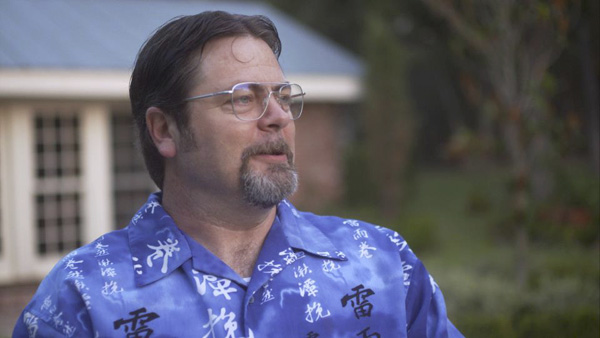The opening credits set a peculiar tone, sashaying between animation, one-liners, time jumps, and the not-unimpressive presence of Ron Swanson, née Nick Offerman, outside of Pawnee, Indiana. By the time the film starts in earnest, director Bob Byington’s hodgepodge of disparate influences is as clear as the difficulty he faces in merging them together. It’s a difficulty that the film never quite overcomes, despite the intrepid efforts of a cast that gamely shticks it up.
The movie follows 35 years in the life of not-quite-sad sack Max, and signals jumps in time with peppy snippets of music composed by Vampire Weekend’s Chris Baio and whimsical animation by Bob Sabiston. Though the animations are lovely on their own, the narrative never quite recovers from their jarring presence. By the fourth or fifth time cartoon clouds drift across the screen, their charm begins to wear thin, and they push the film’s panoply of artificial quirks past the breaking point. Chief among these is the magical suitcase Max carries with him his whole life, which characters will peer into from time to time. Its presence in the film, like its contents, is a mystery.
Events in Max’s life—an affair, a birth, a new business—seem to happen to him rather than because of him, leaving scenes isolated from one another. An uptick in Max and his wife Lyla’s fortunes manages to briefly generate interest in how these people, seemingly so unchanged, will fare, but the answer turns out to be less intriguing than the question since everyone stays pretty much the same.
The film’s good intentions are never in doubt. And though there’s pleasure in seeing the thought and effort that went into the film, it is too noticeable more often than not. Max and Lyla’s son, who doesn’t speak until his twenties and constantly wears glasses and a baseball hat, feels less like an obvious Wes Anderson character than someone whose parents played The Royal Tenenbaums too many times above the crib. As Max, Keith Poulson has a certain pouty charm, but it’s stretched thin by the end. Nick Offerman, so effective on TV’s Parks and Recreation, plays the snarky best friend, and though he occasionally lands a laugh, the hit-to-miss ratio is far too low.
As Lyla, Jess Weixler has a sly charm that nicely subverts the manic pixie dream girl prototype and makes you wonder how she would fare in a different context. Kate Lyn Sheil’s brief presence as an early love interest of Max is natural and unforced—a breath of fresh air. In the bit role of a therapist whom Max and Lyla see for counseling, Megan Mullally manages to wring a few moments of comedy from limited material.
Byington’s previous film, Harmony and Me, was largely improvised, and an unscripted sensibility informs the funniest, most authentic moments of this one. They feel like natural outgrowths of characters rather than directorial imposition, and are funny enough to make you wish the actors had been given free reign, or at least a looser leash.
And there is a lovely range of actors to look at, each with a face so particular as to seem from a different world. From Weixler’s almost farcically angelic triangle to Offerman’s burlesque, masculine square, these exteriors are at once ready-made works of nature and the film’s best special effect. While the scripted patter flies, it’s best to focus on the faces, odd and luminous, that punch through the bells and whistles.







Leave A Comment